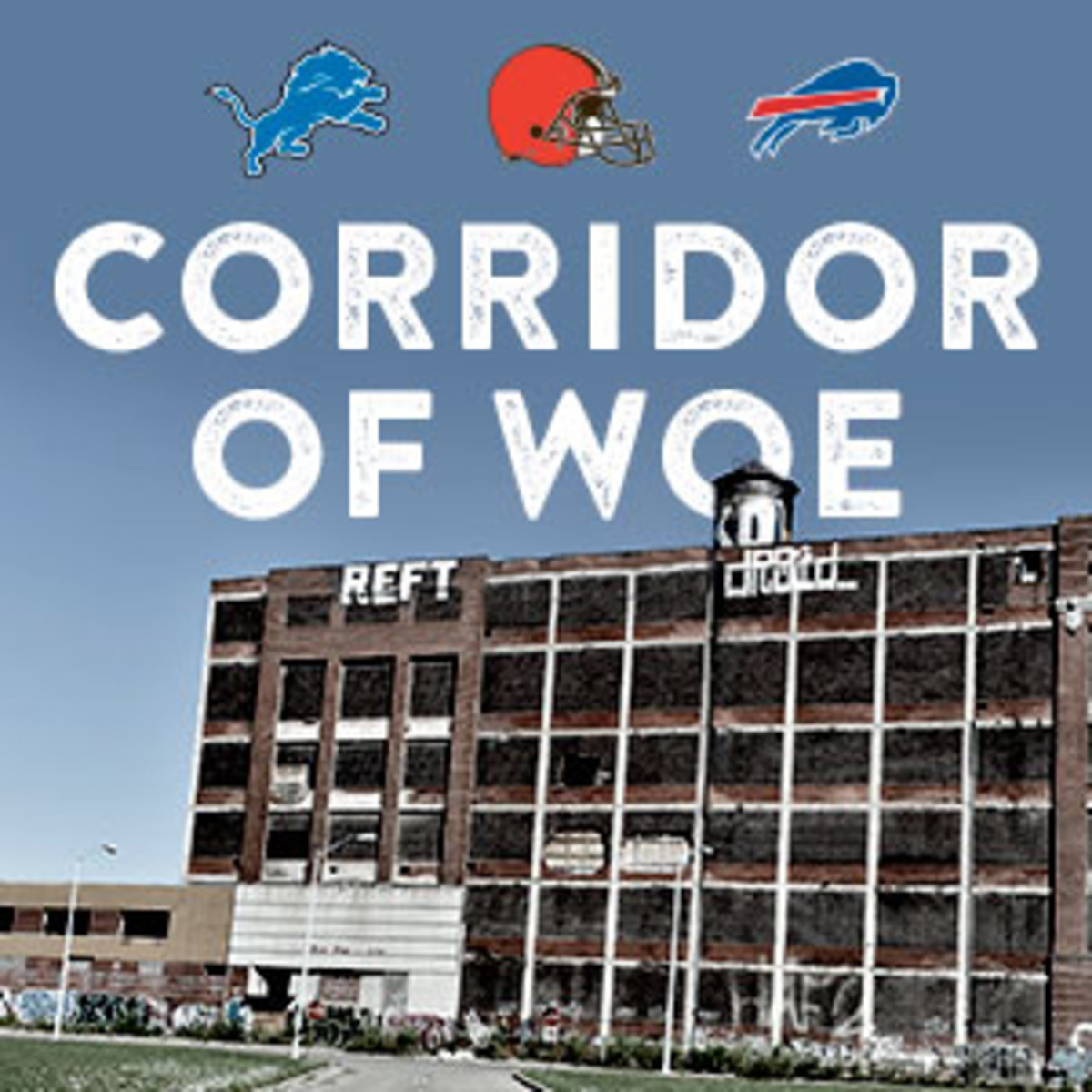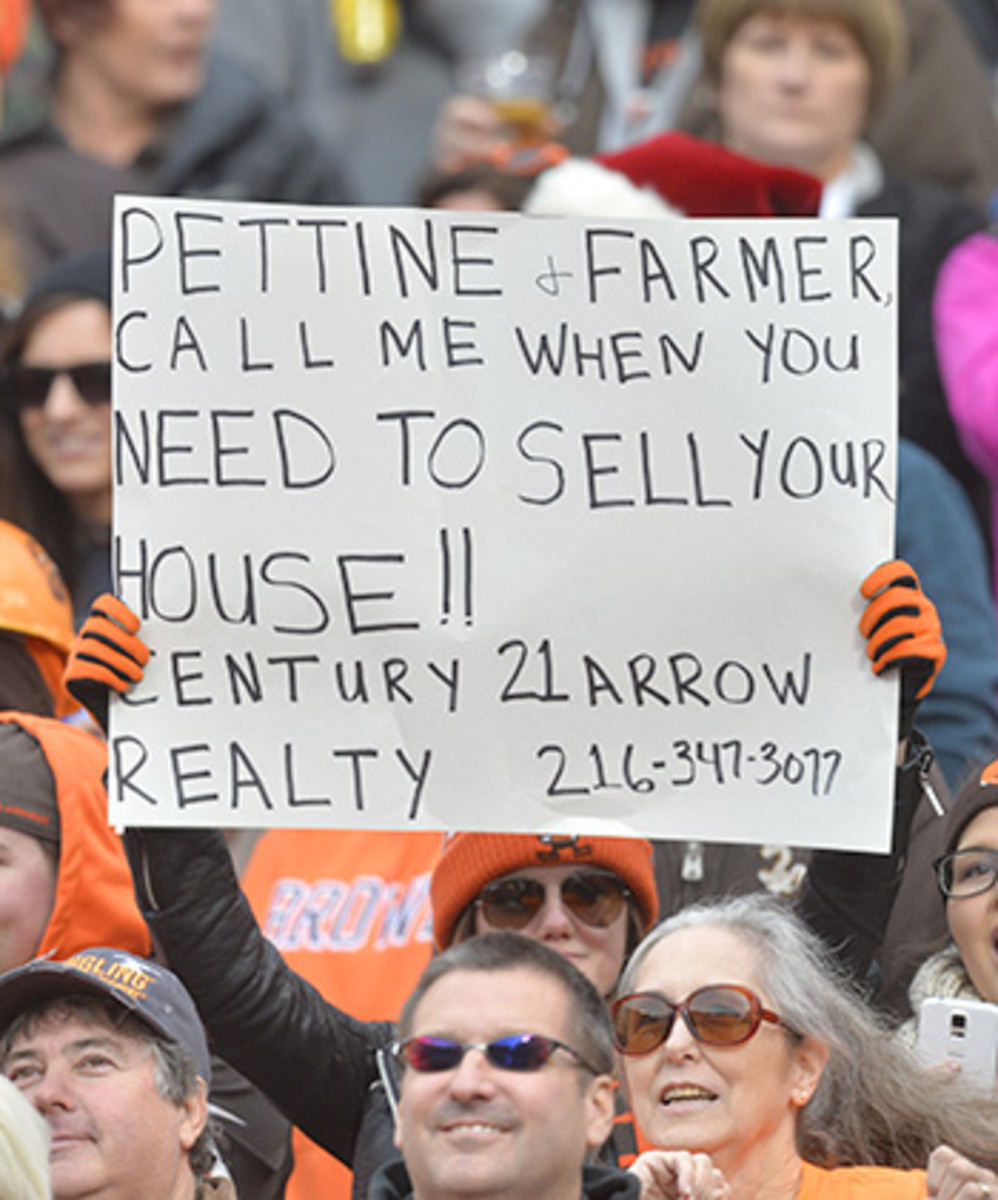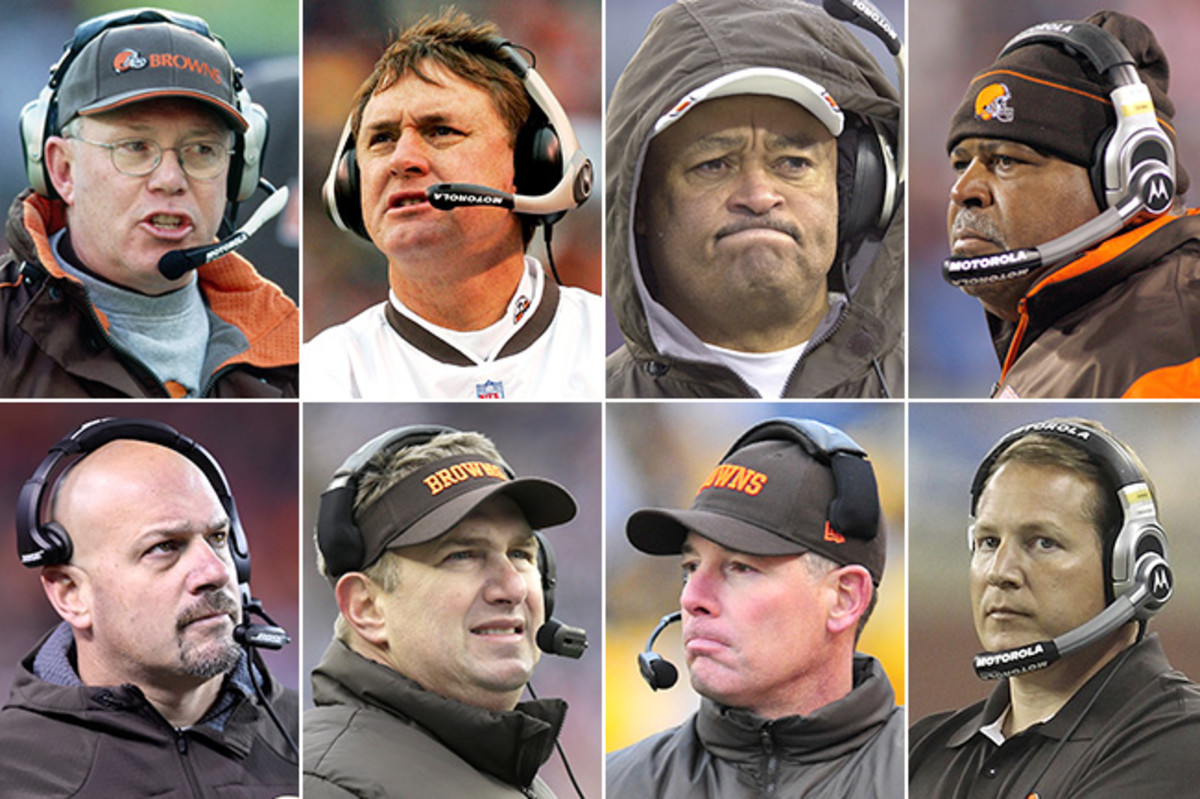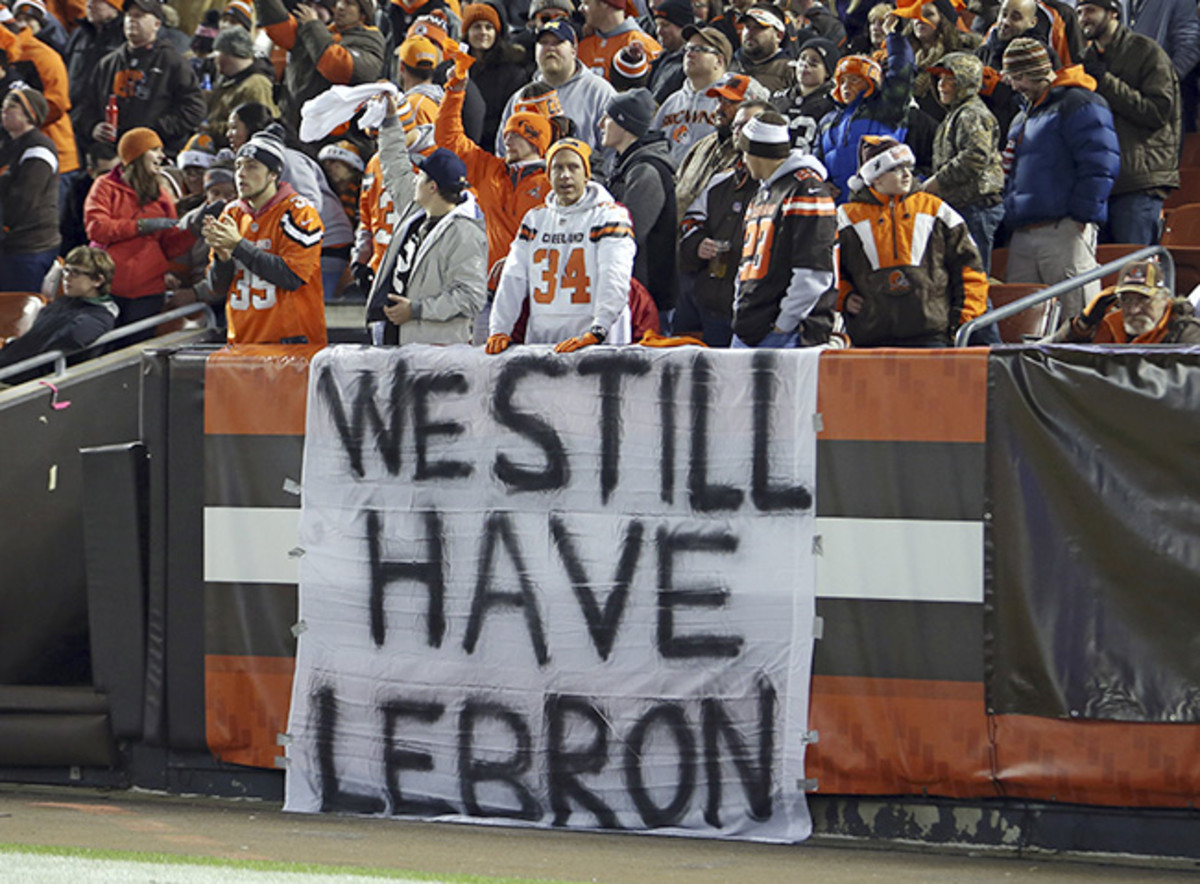A Revolving Door in the Factory of Sadness

BEREA, Ohio — A few weeks ago, trenches had been dug along the edge of the Browns’ outdoor practice fields. There were small piles of dirt, behind yellow caution tape, the early signs that work is about to be done.
Two years ago, the Browns did a total remodel of the upstairs offices at their facility on Lou Groza Boulevard, creating open workspaces with blatant team branding in shades of orange and history. Now, they’ll expand the fieldhouse to a full 100 yards and renovate the players’ downstairs training facilities. There’s an easy metaphor to be made, of course: The Cleveland Browns always seem to be under construction.

Buildings are the easy part. Getting the right people in place to turn the team around has been elusive ever since a professional football franchise was restored to this football-crazed city 16 years ago.
This is the second stop in our “Corridor of Woe” series, looking at what needs to happen to change the fortunes of three teams representing cities in the country’s Rust Belt. While the Lions have languished under a tradition of patience, a few hours southeast in Cleveland, a lack thereof has been the issue. Just ask Joe Thomas. He’s been one of the league’s best left tackles since the Browns drafted him in 2007 but may be equally well-known as the unwitting spokesman for the Browns’ plight.
“The lack of continuity,” Thomas says frankly, “is the No. 1 reason we have been held back as an organization since the team returned in 1999.”
Thomas is in his ninth season. He has played for five head coaches: Romeo Crennel, 2007-08. Eric Mangini, 2009-10. Pat Shurmur, 2011-12. Rob Chudzinski, 2013. Mike Pettine, 2014-? If you don’t think this takes a toll on a team’s long-term fortunes, you don’t know what it’s like to be stuck in the revolving door.
“It’s gotten hard for me the older I’ve gotten, because I’ve realized that it does take time to build something special,” Thomas, 31, continues. “I don’t think you are going to win the Super Bowl the first year you have a new head coach. I look at my career, getting older and older, and saying, my window of opportunity is smaller and smaller. And when you have a new coach, it becomes even smaller, because now you are looking at, probably, legitimately, a three or four-year process to find out if he’s got what it takes, if they’ve got the pieces in place to win consistently. This is my ninth year, next year will be 10, so you do the math.”
With the Browns sitting at an NFL-worst 2-10, their eighth straight losing season assured, more change seems inevitable. The question for this franchise: How many times can you push the reset button?
* * *
FirstEnergy Stadium, where the winds off Lake Erie swirl unpredictably every game day, has picked up an ominous nickname: The Factory of Sadness. Since the stadium opened in 1999—part of the arrangement to renew the franchise after Art Modell took the original operation to Baltimore—the Browns have had eight head coaches, 24 starting quarterbacks and zero home playoff games.
This season has evoked as much sadness as ever, with the “kick-six” loss to the Joe Flacco-less Ravens two weeks ago, followed by a 37-3 pummeling at the hands of their cross-state rivals, the Bengals, on Sunday. Fans last weekend sported paper bags over their heads, reminiscent of the terrible New Orleans “Aints” back in 1980, with messages like “Fire Pettine” and “Play Johnny.” One fan held up a posterboard sign offering her services as a realtor to Pettine and GM Ray Farmer, when they need to sell their houses.

It wasn’t all that long ago—Thanksgiving of last year—that Browns fans were feeling good about their team. They were 7-4 after a win in Atlanta, on the verge of a winning season and possibly a playoff berth. Neither happened; they finished the year on a five-game losing streak. All the positive vibes from Pettine’s first season were erased as the franchise struggled through a series of offseason potholes: Kyle Shanahan asked to be released (and was) after one season as offensive coordinator, Farmer was suspended for impermissible texts sent to coaches during games, first-round pick and then-presumed quarterback of the future Johnny Manziel spent 10 weeks in rehab.
This season, when the Browns returned from their Week 11 bye, the team was 2-8 and ready to find out if it had a quarterback in Manziel. Pettine gave the team a message of staying steady. Don’t let the losing make you question what we’re doing here, he said. Just a few hours later, Pettine was confronted with the release of a video and photos depicting Manziel partying during the bye week despite his promises that he would not. According to Fox Sports’ Jay Glazer, Manziel lied when the team questioned him about it. Manziel was benched for two weeks; after starter Josh McCown broke his collarbone in Week 12, Austin Davis got the start against the Bengals.
Over the past few weeks Pettine’s frustration has surfaced publicly. At his press conference Monday he indicated the organization is not unified and that different factions want different things. Perhaps sensing the need for self-preservation, he made clear that the coaches are not solely to blame for another lost season. “Not just looking in the mirror,” he said, “but to other parts of the building as well.” And, he added, “let’s make damn sure the changes we’re making are the right ones.”

If Pettine ends up taking the fall for this season, Thomas has seen this movie before. His first year in the NFL was Crennel’s third year as the Browns’ head coach, and even rookies heard the rumors that if the team wasn’t winning by the bye week, Crennel would be fired. The Browns responded with 10 wins, but a year later Crennel was let go after a 4-12 campaign. Thomas thought that was a “raw deal,” because the team was shellacked with injuries while playing a difficult schedule. But it became his introduction to Cleveland’s coaching carousel.
He has been in plenty of meetings through the years in which the organization explains why it has hit the reset button again. Thomas has never been at a meeting when he’s been asked his opinion on what the team should do, but if he were asked, this is what he’d say: We’ve got to stay the course.
“I still think it takes time for your vision to come to fruition, and no matter what you see after one or two years, there was a reason you hired the person in the first place, so give him an opportunity to lay out his vision,” Thomas says. “Sometimes it takes a step backward to go two forward.
“We’ve had a lot of great coaches here that, if given the chance, I have no doubt they would have turned this thing into a consistent winner,” Thomas continues. “Because I don’t think there are huge, vast differences in the quality of the coaches between staffs in the NFL. From what I have seen in my nine years, I just don’t think there is as big of a difference as fans and people outside the game want to believe. Bill Belichick is probably the greatest coach in NFL history, but he’s been blessed with Tom Brady at quarterback. Who’s to say that if a different head coach had been put in that situation with Tom Brady, he wouldn’t have also won a few Super Bowls?”
Browns fans don’t need a reminder about Belichick. He coached the Browns from 1991 to ’95, then the team moved, Belichick was fired and Cleveland is still trying to start over.
* * *
When Jimmy Haslam bought the team for $1 billion in 2012, he took on what is perhaps one of the toughest rebuilds in professional sports. The Browns have been chasing the glory days of the 1950s and 1960s, but have seemingly yet to clear the hurdles that came with restarting as an expansion franchise.
Texans owner Bob McNair, chairman of the league’s finance committee, advised Haslam when he was preparing to buy the team. Drawing on his own experience restoring an NFL franchise to Houston, McNair talked to Haslam about the patience he would need to have while trying to steer a turnaround.
“I told him that it took longer than I thought it would take, in our case,” McNair says.
They also talked about how continuity is a common ingredient in some of the league’s most successful franchises. Haslam (who declined to be interviewed for this story) saw that firsthand, during the four years when he held a minority stake in the Steelers before buying the Browns. Part of the challenge of turning around his team is that it plays in a division with three clubs that have been pillars of stability. The Bengals, Ravens and Steelers have each had the same head coach since 2008, while the Browns have had five.

When coaches change, players change. A lack of continuity also makes it tougher to lure the people you want in charge. The Browns have had to overpay for free agents; their 29th-ranked defense takes up 44.81% of the team’s cap, the highest percentage in the league, according to spotrac.com. During their search for a head coach in 2014, the Browns interviewed 10 candidates over 25 days, and top targets like Josh McDaniels and Dan Quinn pulled out. By the time Pettine was hired in late January, most teams’ coaching staffs were already complete.
And consider the toll of turnover on players: Thomas has spent seven of his nine springs learning a new offense. When training camp comes, he and his teammates are still learning the basics, while other teams around the league are working on details. “And in this business, details are what wins,” Thomas says.
Despite receiving lessons in patience, Haslam has been anything but in his three years at the helm. He’s already fired two head coaches, two general managers, a president and a CEO. When Cleveland entertained midseason trade talks about core players like Thomas or veteran center Alex Mack, it was the look of a team headed for another rebuild.
Haslam might look trigger-happy, but those who know him well say he’s still riding the learning curve in his new business venture and is earnestly trying to find the right pieces to bring success. And right now, there are a lot of missing pieces.
Only one of the Browns’ past five first-round picks, rookie nosetackle Danny Shelton, has been a full-time starter this season. Receiver Dwayne Bowe, who was given $9 million in guaranteed money this past offseason, has just three catches. Several starters who were allowed to leave as free agents in the last two years are now playing key roles for teams in the playoff hunt: linebacker D’Qwell Jackson (Colts), defensive end Jabaal Sheard (Patriots), cornerback Buster Skrine (Jets) and safety T.J. Ward (Broncos). And the Browns haven’t seen enough from Manziel on the field to know if he could be an answer at quarterback—though they may have seen too much off of it.
Haslam’s tenure as the Browns owner got off to a tumultuous start, with his family-owned company, Pilot Flying J, under federal investigation for fraud (the company paid a $92 million fine while Haslam, who has said he was unaware of the scheme to withhold promised rebates from some customers, was not charged). But he has worked to be an involved team owner. He and his wife, Dee, moved to Cleveland part-time from Knoxville, Tenn. Their investment kick-started the financing for $120 million renovations at FirstEnergy Stadium, and they’ve contributed $1 million to a local charter-school network Dee has worked with. Out in the community, they hear the locals’ criticism, and they don’t disagree.
“It isn’t like the Haslams bought the team for a dollar,” says Albert Ratner, prominent Cleveland real-estate developer and friend to the Haslams, and one of the men who helped facilitate the Browns’ return to the city in 1999 by convincing area business leaders to commit to suites in the new stadium. “They spent a fortune to buy the team, and they didn’t buy it to have the worst record in the league. I have no knowledge if they would make changes, but what I do have knowledge about is their dissatisfaction they haven’t done better. And these are people who look at a problem and solve it.”
* * *
A quick drive south, in Independence, Ohio, Cleveland’s biggest celebrity has just finished a morning shootaround. The Browns are the city’s first love, but LeBron James draws sellout crowds for Cavaliers games at Quicken Loans Arena. An Akron native, James is a lifelong Browns follower, and he also happens to know a little something about changing the hopes of a franchise.
“Winning cures a lot of things,” James says. “But it starts with the culture, and how guys are believing, and being professional every single day. To be able to come here and change the culture—to know what we want is to be great as we can be every single day. Does that result in wins every day? Absolutely not. But you work at it, and that’s everyone from top to bottom. We all have the same goal, and it’s great to be a part of that. Obviously, the Browns would love that as well.”
The next question James is asked is how the Golden State Warriors have managed to stay undefeated, and his answer is just as telling.
“Consistency,” he says.

Yes, the Browns would love that as well. Sometimes, Thomas wonders if maybe the city’s fervor for its football team ends up hurting it. The last time the Browns won a playoff game was 1994, and that was the old Browns. Sunday’s loss officially eliminated the Browns from playoff contention for the 13th straight year, so this won’t be the year, either. In a weird way, losing here is both routine, and highly emotional.
“Cleveland is such a great football town, with so many passionate fans who expect a lot, which is great,” Thomas says. “But I think sometimes those high expectations and that scrutiny works against them. They are so emotional about each loss, the natural human instinct is, Ah, we’ve got to start over; this isn’t the team; this isn’t the coaching staff; these aren’t the players we need. You have to give them a chance, to lay the foundation and build upon that and turn the team into a winning franchise.”
The Browns are again at a fork in the road: Stay the course, or keep pushing the reset button, as many times as it takes to get it right.
“I would say to the fans up there, be patient, you’ve got a good owner, and he’s going to get good results for you,” McNair says. “It will probably take longer than the fans want, and he wants, but keep the faith. He’s very intelligent, and he’s hard working and he has the resources to bring to bear. That’s typically what it takes.”
But for now, as another disappointing season comes to a close, it seems the revolving door is going to spin again.
